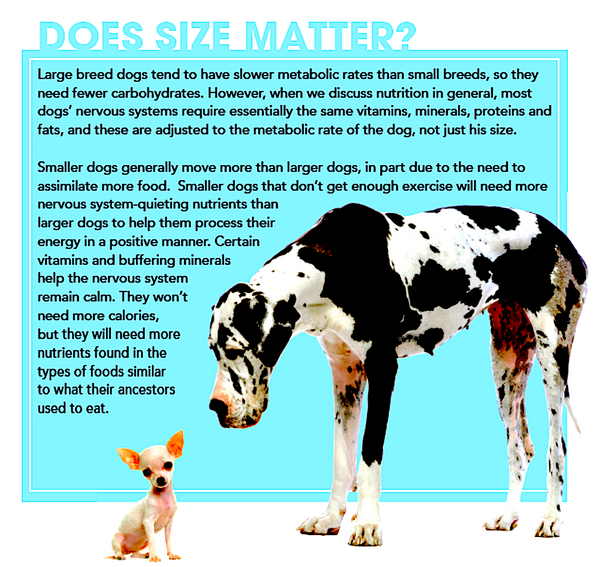
Many things can affect the health and function of your dog’s nervous system. Good nutrition helps ensure it does its job properly.

When you think about your dog’s health, you might not factor in his nervous system. But maintaining its proper function is very important to his well-being, physically and emotionally. Feeding your dog’s nervous system is one way to ensure it stays healthy and functions properly.
The canine nervous system
Your dog’s nervous system evolved to match the environment in which his species developed. His brain also changes depending on where and how he lives; when it is sending out signals of stress to the body, it becomes quicker at noticing small changes in the environment. This can result in behavioral changes that seem inappropriate.
The priorities of your dog’s nervous system include being able to maintain an internal chemical environment that allows him to survive. Building protein chains is an important process of the nervous system; these chains help shape the animal and aid in communication between body systems.
Balanced Omegas
While modern dogs should eat meat on a regular basis, many commercially-prepared dog foods are grain-based. Grains and grain products tend to be inflammatory, produce fat rather than muscle, and provide different proteins to what the dog’s ancestors utilized to evolve into the modern animal. Your dog’s ancestors ate diets high in Omega 3 fatty acids, which helped their prostaglandin* systems reduce inflammation when they were ill or wounded. This balanced their inflammatory responses to illness or infection to help them survive.
Feeding your dog appropriate Omega-balanced diets comes down to feeding the kinds of protein and fat their ancestors ate. His nervous system developed as a result of these diets, which included bugs, lizards and meat from birds, small animals and fish. Modern dogs have an ancestral need for these types of protein.
Organ meats are key
Integral to the canine diet are organ meats, which are made up of proteins that differ from those found in skeletal muscle meats. The wild canine that catches his own prey will first eat the organs, then the muscle off the bones, before he eats the bones themselves, which are highly digestible when raw.
Carnivorous animals lack enzymes that affect their inflammatory and anti-inflammatory systems. Both delta-6 desaturase (D6D) and D5D enzymes must be obtained from their food supply. This is why carnivorous animals prefer organ meats to muscle meats, as they supply dihomo-γ-linolenic acid (DGLA), arachadonic acid (AA) and docosahexaenoic acid (DHA). Fish liver oils and organ meats are a must in order to keep the dog’s prostaglandin pathways functional.
The CNS and body function
Body function and movement require a central nervous system (CNS) that is functioning at 100%. Every organ system in the body is controlled by the CNS. According to Roger Sperry, 1981 Nobel Laureate, “90% of the energy output of the brain is used in relating the physical body to its gravitational field.”
Nerves transmit data from the brain and spinal column to the rest of the body and then back from these remote areas to the central nervous system. The input to your dog’s feet tells him which muscles to contract and which to relax in order to stand efficiently. When a healthy dog is standing, he is using very few muscles and very little energy. This allows energy to be utilized for maintaining organ systems, digesting food and healing damaged cells.

One thing dogs are exceptional at doing is observing. They spend much of their time watching the world go by. This evolutionary skill allows them to more efficiently locate and then capture food without expending a lot of energy that can be used for other things.
Healing requires 400% more energy than maintenance, and this energy will not be available in a dog that is exhibiting poor posture. A dog that stands with altered joint angles may lead to positive results on an orthopedic flexion test. Using more energy to stand leads to earlier fatigue. Thus, animals that can’t stand also begin to move less.
These dogs require a different diet to compensate for the fatigue and abnormal use of nutrients due to stress hormones released by the brain. They will need a diet similar to that of a dog that remains in a cage all day with no exercise. This isn’t because the dogs aren’t moving, but because both are similarly stressed and their nervous systems are working in similar ways; just as the inflammatory system is there to combat foreign invaders, it also turns on to combat stress
Nutrition and the stress response
Other ways to turn on the stress response include inappropriate nutrition. Deficiencies of biotin, vitamin E, protein, zinc, B12 and B6 all interfere with the action of D6D and other enzymes involved in prostaglandin production. B12 and B6 are found only in animal products and are highly sensitive to heat. Typical commercial dog foods are heated to 360°F in oils (usually corn or soy, which are high in Omega 6 but deficient in Omega 3). The heat damages the vitamins, proteins and other nutrients.
The best sources of biotin, vitamin E, protein, zinc and B vitamins are raw dairy products, raw fish and raw meat. Zinc absorption is inhibited by the phytic acid found in grains and legumes, particularly soy, which have not been properly prepared. The best sources of zinc are animal proteins — red meat, organ meats and some sea foods such as oysters. Both malnutrition and overeating interfere with D6D.
Any time the nervous system is stressed, it releases hormones as a response to preserving life. When stress is a constant, daily, long term event, the metabolic level of the dog changes. Such dogs need more proteins of the appropriate types to help their nervous systems build the right kind of hormones, prostaglandins, and DNA and keep the system working and less inflamed.
As you can see, correctly feeding your dog’s nervous system depends on a number of factors. Start with a complete and balanced high quality meat-based diet that includes nutrient-rich organ meats as well as muscle meats and raw bone. Environmental and lifestyle factors such as stress, lack of exercise, or issues with your dog’s posture can all affect the functioning of his nervous system; take them up with your AVCA-certified animal chiropractor, holistic or integrative veterinarian. Factoring your dog’s nervous system into his diet will lead to better health, balance and behavior!
______________________________________________________
*Prostaglandins are derived from arachidonic acid and are hormone-like substances important to a wide range of body functions.
Authors: Bill Ormston, DVM and Dr. Amy Hayek
Link: Feeding your Dog’s Nervous System
Need some professional help for your injured or painful dog? Need to get your canine athlete back to peak performance? Click on the image below and connect with a virtual consultant. Help at home is just a click away.




